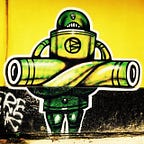What’s H.E.R. Deal?
H.E.R.’s first tour as a headliner leaves a lot of questions unanswered.
For someone whose name is an acronym for “Having Everything Revealed”, she’s very hard to see. She’s shrouded in mist, hardly more than a silhouette against the blue stage lights. Behind those giant sunglasses, under a mane of curly hair and wrapped in a nondescript Adidas track jacket H.E.R. sings the first notes of her set.
The audience filling Neumos — a 650-person Seattle venue known for hosting mid level acts on their way either up or down the fame ladder — is mostly teen girls and young women. Couples and R&B purists out to see a young up-and-comer fill the remaining space. It’s a fun-loving, artsy vibe, appropriate for a Wednesday night in Seattle’s rapidly gentrifying gay and bohemian nerve center, Capitol Hill.
Inside, the setting is intimate. Screeches of elation and curious mumbles emanate from the crowd. A thrum of excitement at seeing someone that might soon be in the upper stratosphere of R&B talent is palpable. Above the screeches and mumbles H.E.R. opening notes hit. They’re crisp and clear.
She moves through her set at a brisk pace. Her thoroughly R&B songs meanwhile, range in speed from slow to steady. Many of them seem to consciously fend off an impulse to veer in a pop direction. It’s a refreshing inclination in an era when artists and their advisors seem eager to chase after any trend — be it trap rap or EDM — like a cat after a laser pointer.
Like any good R&B traditionalist, H.E.R. sings about love — a lot — usually singing to a proverbial “you.” Singing about “loving you” and “wanting you” are tried and true R&B adages — tropes or timeless truisms depending on whom you ask. But she sings to “you” as if inviting listeners to take her song and sing it to whomever they think should hear it. It’s a fun trick, giving the fans something of yours to make their own.
Like any culturally attuned artist, H.E.R. blends the traditional feel of her love songs with modern lyrical references, mostly about cell phones and video games. If the thing she sings about most is “you”, the thing she sings about second most is your phone, namely putting it down. The people in her life seem very distracted by technology, which is relatable and understandable. While lines like “you wont listen \ you’re too busy playin’ 2K” inspire empathy from listeners, her voice does just the opposite. It’s the one thing no one else can have.
She’s experimental on stage if occasionally stiff. During one song she slaps drumsticks against an electric drum machine, the next she massages a keyboard and the next she pieces together a guitar solo, more for dramatic effect than to impress any guitar heads in the crowd — there aren’t many.
The best part of her set is, aptly, during “Best Part”, her hit duet with Daniel Caesar. Daniel isn’t here, but a young couple is. She invites them on stage and they proceed to get engaged in front of a charmed and optimistic crowd. Ironically, during a later interlude, H.E.R. tells the crowd to “not fuck it up” when giving or receiving love. While the sentiment is more along the lines of “don’t let trivial bullshit get in the way of experiencing love,” it seems, in the moment, like a lot of pressure to put on a guy who just got engaged on stage.
She works the crowd, even giving some girls in the front row a chance to sing into the mic. At one point she lets a fan sing a lyric from a Kendrick and Rihanna song, only to realize that the person doesn’t actually know the lyrics. She pulls the mic back. “Ya’ll don’t even know the words,” she says, pausing. “Hahaha, neither do I.” An endearing fib.
Who is she? Who is H.E.R.? Maybe that’s the point.
She’s at once no one and anyone.
She’s so relatable, too relatable by pop music standards anyway. Our speakers are filled with stories of the rich and famous. Now here’s this girl in an Adidas track jacket singing about coffee and 2K. It’s refreshing but unsettling at the same time, like that sip of Sprite that takes you past the can-half-full point — as if, in a whir of publicity and summer festival sets, all that sweet, fizzy empathy could be gone.
But would it be?
She seems so intentional, so consciously constructed to give anyone the chance to envision themselves as H.E.R. Well, any girl. But hell, you put me in a poofy wig, big shades and a tracksuit and I might be able to go on stage without the back row knowing any better. It’s intentional enough to think that the shades might stay on at Coachella; that the track jacket might stay on on Jimmy Kimmel. Maybe her hair is just thick enough to keep the record execs and marketers out of her ears.
But why the anonymity? Is she eschewing personal attention to shine a light on the music? Is she perpetuating mystery just to play off her stage name? Is it a meta-marketing approach to give any fan-girl easy access to an imaginary world in which they’re the star on stage? Or is she simply shy? Does her persona reference the objectification of women in pop culture? Is she actually Joaquin Phoenix in disguise, creating a documentary as his magnum opus of method acting? Is it a bigger statement than that entirely?
Maybe it’s all those reasons, maybe it’s none of them.
It’s almost surprising that she’s on stage at all. It’s almost as if her deepest wish is to be nothing other than a voice, an abstraction of R&B music itself. But I think, for now, she’ll settle for you putting down your phone.
